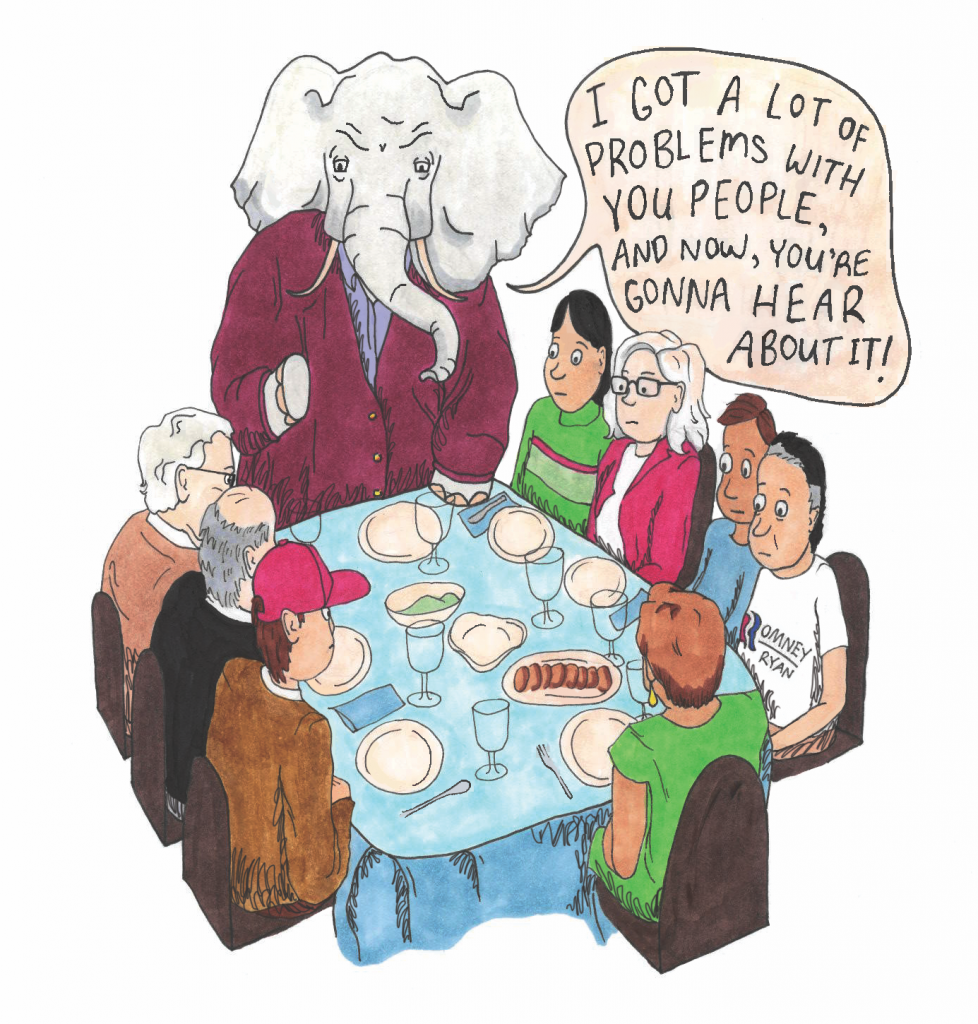The Costanzas and party criticism

As American politics grow increasingly tribalistic, party identity becomes a delicate badge to wear. It has become an “us versus them” mentality — two parties gathered in their respective tents away from the cold, harsh world that is the other side of the political aisle. The more tribal parties become, the more intraparty criticism becomes unwelcome — but this should not be.
This isn’t encouraging party civil war but rather acknowledging that no party is perfect. Both parties sometimes support the unsupportable and defend the indefensible. Productive dialogue and accountability should serve as a form of party self-government.
Parties in the United States rally around shared political values, but the Republican and Democratic Parties each have tens of millions of voters and hundreds of elected officials throughout the country, so there is bound to be diversity. Both have their moderates, their establishments, their outliers and their nutjobs, each having a unique — or irritating — perspective in the party.

Sometimes there are genuine disagreements, and the politically active should push for productive discussion instead of blindly supporting their party without a critical thought or a sense of social responsibility. The party line is not the be-all and end-all.
Perhaps — if you would bear with me — an iconic television comedy from the 1990s could provide some perspective. Take, for example, George and Frank Costanza, the dysfunctional father-son duo on “Seinfeld.” Each imparted memorable quotes that, with a warped application to this context, show the two attitudes people often have
toward their own parties.
George Costanza, the quirky, self-loathing son, has the perspective of most people: “I’m much more comfortable criticizing people behind their backs.”
In an increasingly chaotic and negative world, I get it. It is uncomfortable.
Most people prefer to stay in their comfort zones when keeping up with politics for the sake of their own sanity, for which I could not be more sympathetic. It’s easy for them to turn on their preferred news network and get armed with quick talking points to blame the other side. It’s easy to keep their thoughts to themselves when their party messes up — or just has a simple policy disagreement.
They might ignore negative information because it could destroy the utopian solution they conceive their party to be. This is the main culprit of the tribal problem. News has become so partisan that it’s hard to get a real sense of what each side is doing. It takes a multitude of news perspectives to truly know what’s going on.
An extreme yet revealing instance I’ve experienced is when I tell fellow Republicans about Kari Lake’s questioning the Christian faith of Mike Pence because he supported another Republican in the Arizona governor’s primary — there’s video proof of this on Twitter, by the way. They’re shocked and disheartened, and their response gets to the very root of this issue: “There’s no way. I didn’t know that.”
Taking that next step isn’t easy, but overall, it is a beneficial one for those who are brave enough to take politics seriously. For anyone who wants to surpass the shallow level of daytime TV political analysis and really think critically about politics, I present the Frank Costanza method.
“At the Festivus dinner, you gather your family around, and you tell them all the ways they have disappointed you over the past year.” Now that’s more like it, I say with some jest.
Criticizing your own party isn’t about being a jerk or self-righteous. Sometimes it’s about doing the right thing and building up the party.
The ability to criticize your own party is necessary in ensuring party survival. When a child does something wrong, the parent disciplines the child for his own good. When a political party is in the wrong, should it not be justly criticized for the betterment of the party?
If nobody inside the party is there to critique its problems, then elections are the natural repudiation of an unappealing party. The GOP saw this in the midterms a month ago, where every Trump election-denying candidate in a competitive race lost, almost causing complete disaster for the Republicans.
As that brand of politicking infiltrated the party, no one initiated critical discussion until it was too late. When Rep. Liz Cheney tried, she was swiftly blacklisted by her party. Regardless of how anyone feels about her, the voters said “I told you so” for her.
As the Republican Party reckons with its recent decline, a valuable lesson unfolds on the need for intraparty criticism. Perhaps Frank Costanza would’ve laid into the GOP and stopped their fall into detestability. Sometimes a party needs a good, loving kick in the pants.
Politics needs more Frank Costanzas: those who are willing to openly criticize the imperfect party they support.
Browder is the graduating opinion editor.

